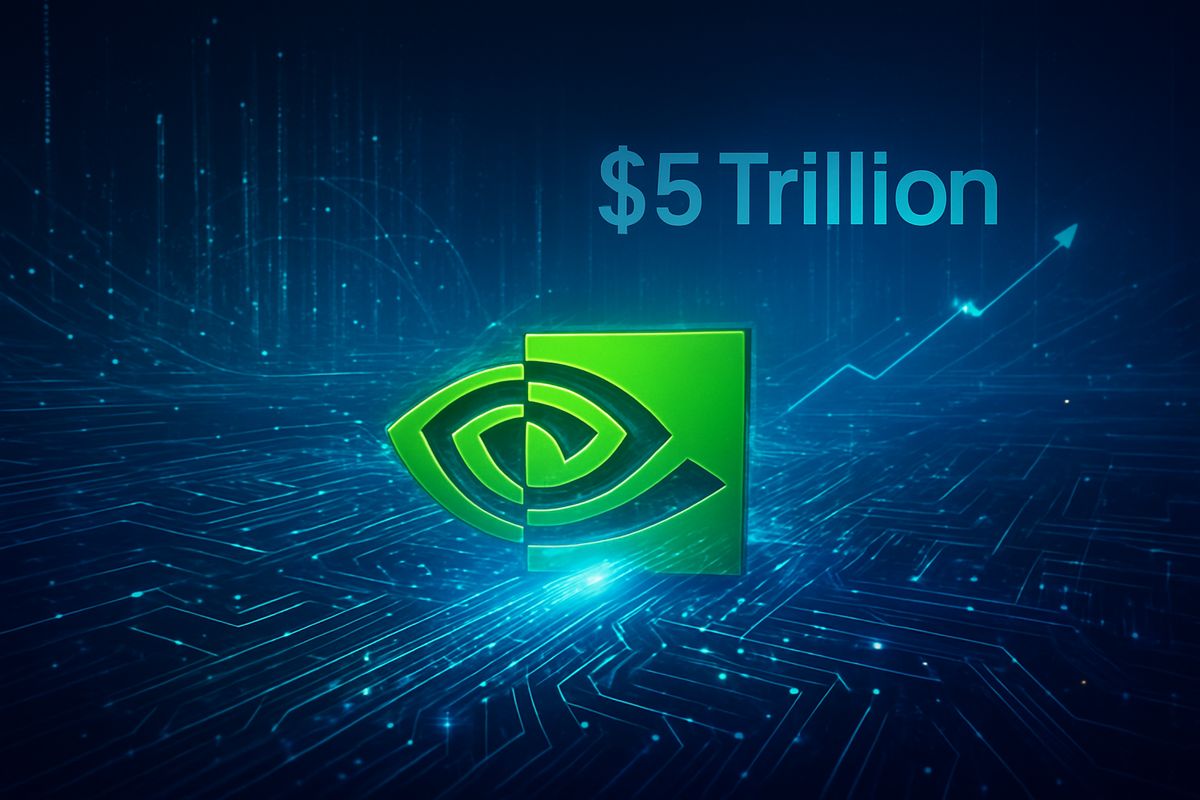
October 29, 2025 – In a monumental day for the financial markets, Nvidia Corporation (NASDAQ: NVDA) today surged to an astonishing new all-time high, officially becoming the first company in history to achieve a staggering $5 trillion market capitalization. This unprecedented milestone underscores the chipmaker's indispensable and accelerating role in the global artificial intelligence (AI) revolution, sending ripples of optimism and strategic re-evaluation across the technology sector and beyond. The surge is a clear testament to the relentless demand for its advanced graphics processing units (GPUs), which are the foundational engines powering the generative AI boom and the expanding data center infrastructure worldwide.
The immediate implications of Nvidia's historic ascent are profound. It solidifies the company's position as a critical linchpin in the digital economy, effectively setting the pace for innovation and investment in AI. For the broader market, particularly the tech-heavy Nasdaq Composite, Nvidia's performance acts as a powerful barometer, signaling robust investor confidence in AI's long-term growth trajectory. While some analysts caution about potential market concentration risks, today's surge primarily reflects a strong conviction in Nvidia's technological leadership and its ability to consistently deliver groundbreaking solutions for an increasingly AI-driven world.
The Unstoppable Ascent: Details of Nvidia's Historic Day
Today's record-breaking performance for Nvidia (NASDAQ: NVDA) was the culmination of an extraordinary period of growth, driven by an "insatiable demand" for its AI accelerators. The stock's journey to a $5 trillion valuation has been marked by several significant milestones, tracing a trajectory that began to steepen dramatically from 2023. After surpassing $1 trillion in mid-2023, the company's market cap doubled to $2 trillion by March 2024, then swiftly climbed to $3 trillion by June 2024, and breached $4 trillion in July 2025. The final leap to $5 trillion on October 29, 2025, reflects sustained investor confidence, robust earnings, and strategic expansions.
The core of this surge lies in Nvidia's unwavering dominance in the data center segment, which now accounts for a staggering 88.27% of its total revenue, reaching $115.19 billion in fiscal year 2025. In the third quarter of fiscal year 2025 alone, data center revenue hit a record $30.8 billion. Nvidia commands an estimated 90% to 92% market share in discrete GPUs for data centers, essential for training and deploying complex AI models. Its proprietary CUDA software platform continues to be a formidable competitive moat, locking developers into its ecosystem and reinforcing its market leadership. Key product developments, such as the Blackwell architecture and the anticipated Rubin CPX GPU, alongside an "annual rhythm" of product launches, ensure Nvidia remains at the forefront of AI hardware innovation.
Major tech giants, including Alphabet (NASDAQ: GOOGL), Amazon (NASDAQ: AMZN), Meta Platforms (NASDAQ: META), and Microsoft (NASDAQ: MSFT), are significant clients, collectively contributing approximately 40% of Nvidia's revenue as they pour billions into AI infrastructure. Furthermore, Nvidia has expanded its global footprint through high-profile deals to supply AI GPUs to nations like Saudi Arabia and the UAE and is actively building sovereign AI supercomputing centers across Europe. The recent $40 billion acquisition of Aligned Data Centers further underscores Nvidia's strategic investment in scaling its AI infrastructure and cooling technologies, ensuring it can meet the ever-growing global demand.
Ripple Effects: Winners, Losers, and Market Adjustments
Nvidia's (NASDAQ: NVDA) unprecedented surge creates a distinct landscape of winners and losers across the technology and broader financial markets. The most obvious beneficiaries are Nvidia's direct customers and partners who are deeply embedded in the AI ecosystem. Cloud service providers like Amazon Web Services (AWS) (NASDAQ: AMZN), Microsoft Azure (NASDAQ: MSFT), and Google Cloud (NASDAQ: GOOGL) continue to heavily invest in Nvidia's GPUs to power their AI offerings, directly benefiting from the availability of cutting-edge hardware. Companies developing AI applications, from large language models to autonomous driving systems, also win by having access to the most powerful and efficient computing platforms.
Conversely, competitors in the semiconductor space face intensified pressure. While Advanced Micro Devices (NASDAQ: AMD) and Intel Corporation (NASDAQ: INTC) are aggressively pursuing their own AI chip strategies, Nvidia's commanding market share and robust ecosystem present a formidable challenge. AMD's Instinct accelerators and Intel's Gaudi chips aim to capture a slice of the lucrative AI market, but they must contend with Nvidia's established dominance and the deep integration of its CUDA platform. The sheer scale of Nvidia's R&D and manufacturing capabilities further widens the gap, making it harder for rivals to catch up quickly.
Beyond direct competitors, companies whose business models rely on traditional computing paradigms or those slower to adopt AI may find themselves at a disadvantage. The shift towards AI-centric computing demands significant capital expenditure and strategic realignment, which can strain companies not prepared for this rapid transformation. Furthermore, the concentration of market value in a few AI-dominant players, like Nvidia, could lead to concerns about market breadth and potential imbalances, although for now, the prevailing sentiment is one of growth and innovation.
Broader Significance: AI's Defining Era
Nvidia's (NASDAQ: NVDA) historic valuation on October 29, 2025, is more than just a stock market event; it is a profound indicator of the broader industry trends and the transformative power of artificial intelligence. This surge firmly places AI at the forefront of a new technological revolution, akin to the internet boom or the rise of mobile computing. The "Artificial Intelligence Shock" that began in 2023 with the advent of generative AI applications has fundamentally reshaped corporate investment priorities, creating an entirely new economic paradigm where AI capabilities are paramount.
The ripple effects extend far beyond the semiconductor industry. Nvidia's success validates massive investments in data center infrastructure, advanced cooling solutions, and specialized software development. This momentum encourages further innovation across the AI value chain, from materials science for chip manufacturing to advanced algorithms for machine learning. Regulatory bodies and policymakers are increasingly grappling with the implications of such rapid technological advancement, considering issues of data privacy, ethical AI development, and potential market monopolies. The sheer scale of Nvidia's market capitalization could invite closer scrutiny regarding antitrust concerns, though its growth has largely been driven by innovation and market demand rather than predatory practices.
Historically, this period draws comparisons to previous tech booms, such as the dot-com era or the early days of personal computing. However, the foundational nature of AI, impacting virtually every industry from healthcare to finance to manufacturing, suggests a more pervasive and sustainable transformation. Nvidia's proprietary CUDA platform, in particular, represents a significant competitive moat, similar to how operating systems or network protocols once created powerful ecosystems, making it difficult for new entrants to dislodge the incumbent. This event underscores the critical importance of intellectual property and ecosystem lock-in in defining market leadership in the modern tech landscape.
What Comes Next: Navigating the Future of AI
Looking ahead, Nvidia's (NASDAQ: NVDA) trajectory suggests a continued, aggressive push into the expanding frontiers of artificial intelligence. In the short term, investors and industry observers will keenly watch for the successful rollout and adoption of Nvidia's next-generation architectures. The "Blackwell Ultra" systems are expected in late 2025, followed by the highly anticipated "Vera Rubin" architecture in 2026. These product cycles are critical for maintaining Nvidia's technological lead and meeting the ever-increasing computational demands of more sophisticated AI models. Continued strong earnings reports, particularly from the data center segment, will be crucial in sustaining investor confidence and market momentum.
In the long term, Nvidia is strategically positioning itself to capture a significant portion of the projected $3 trillion to $4 trillion global data center spending by 2030. This includes further investments in sovereign AI supercomputing centers, expanding its partnerships with governments and major enterprises worldwide. Potential strategic pivots may involve deeper integration into specific industry verticals, such as healthcare AI, advanced robotics, or smart cities, leveraging its core GPU technology to develop end-to-end solutions. The company's acquisition strategy, exemplified by the Aligned Data Centers deal, indicates a willingness to invest in the physical infrastructure necessary to support its AI ambitions.
Market opportunities will emerge not only for Nvidia but also for companies that can effectively build upon its platform. This includes software developers creating AI applications, service providers specializing in AI deployment and optimization, and infrastructure companies providing complementary technologies like advanced networking and storage. Challenges may arise from increased competition, potential regulatory headwinds, and the inherent risks of a rapidly evolving technological landscape. However, the current scenario points to a future where AI continues to be a dominant force, with Nvidia at its epicenter, driving innovation and reshaping global industries.
Comprehensive Wrap-Up: A New Era Defined by AI
Today's historic surge of Nvidia (NASDAQ: NVDA) to a $5 trillion market capitalization on October 29, 2025, marks a pivotal moment in the financial markets and the broader technological landscape. The key takeaway is clear: artificial intelligence is not merely a trend but a foundational shift, and Nvidia stands as its undisputed architect. The company's relentless innovation in GPU technology, coupled with its strategic ecosystem lock-in through CUDA, has created an unparalleled competitive advantage, making it the essential infrastructure provider for the global AI revolution.
Moving forward, the market will continue to assess the sustainability of this growth. While some may point to the potential for an "AI bubble," Nvidia's performance is underpinned by tangible, accelerating demand from major corporations and governments investing heavily in AI capabilities. The company's consistent delivery of groundbreaking products and its strategic expansion into new markets, such as sovereign AI, suggest a robust long-term outlook. The "risk-on" investor sentiment towards growth-oriented technology stocks, fueled by expectations of supportive macroeconomic conditions, further contributes to this optimistic assessment.
Investors should watch for Nvidia's upcoming product announcements, particularly the performance and adoption of its Blackwell Ultra and Vera Rubin architectures. Monitoring the growth rates of its data center segment, its continued market share in AI GPUs, and any new strategic partnerships or acquisitions will be crucial indicators. Furthermore, the broader regulatory environment surrounding AI and potential competitive responses from other semiconductor giants will be important factors to consider. Nvidia's journey to $5 trillion is a testament to the power of technological innovation and a defining moment for the AI era, setting a new benchmark for corporate valuation and influence in the 21st century.
This content is intended for informational purposes only and is not financial advice.





